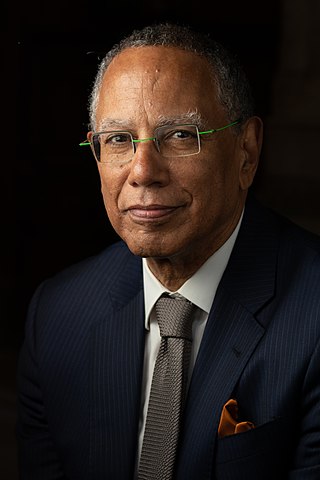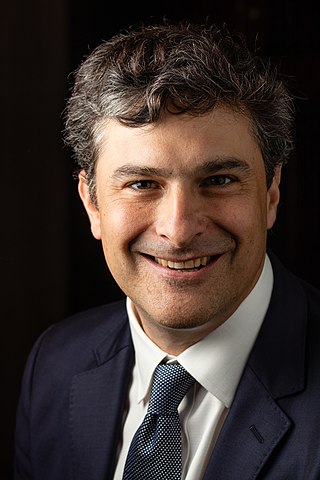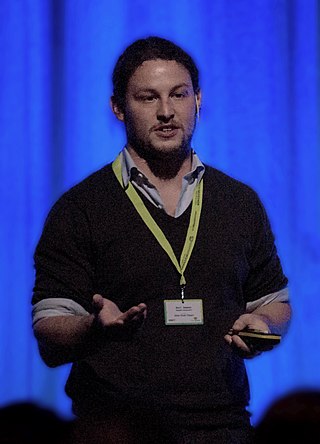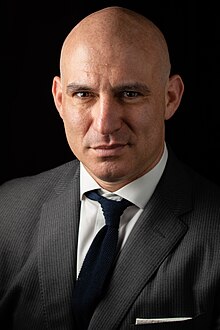John Fisher Burns is a British journalist, and the winner of two Pulitzer Prizes. He was the London bureau chief for The New York Times, where he covered international issues until March 2015. Burns also frequently appears on PBS. He has been called "the dean of American foreign correspondents."
Barry Leon Bearak is an American journalist and educator who has worked as a reporter and correspondent for The Miami Herald, the Los Angeles Times, and The New York Times. He taught journalism as a visiting professor at the Columbia University Graduate School of Journalism.
Clifford J. Levy is deputy publisher of two Times company publications, the Wirecutter and The Athletic. He is a two-time Pulitzer Prize winner and considered one of the main architects of the digital transformation of The New York Times.
Dexter Price Filkins is an American journalist known primarily for his coverage of the wars in Iraq and Afghanistan for The New York Times. He was a finalist for a Pulitzer Prize in 2002 for his dispatches from Afghanistan, and won a Pulitzer in 2009 as part of a team of Times reporters for their dispatches from Pakistan and Afghanistan. He has been called "the premier combat journalist of his generation". He currently writes for The New Yorker.

Joseph F. Kahn is an American journalist who currently serves as executive editor of The New York Times.

Dean P. Baquet is an American journalist. He served as the editor-in-chief of The New York Times from May 2014 to June 2022. Between 2011 and 2014 Baquet was managing editor under the previous executive editor Jill Abramson. He is the first Black person to have been executive editor.

David Stephenson Rohde is an American author and investigative journalist, he is the former online news director for The New Yorker and now serves as Senior Executive Editor, National Security, for NBC News. While a reporter for The Christian Science Monitor, he won the Pulitzer Prize for International Reporting in 1996 for his coverage of the Srebrenica massacre. From 2002 until 2005, he was co-chief of The New York Times' South Asia bureau, based in New Delhi, India. He later contributed to the newspaper's team coverage of Afghanistan and Pakistan that received the 2009 Pulitzer Prize for International Reporting and was a finalist in his own right in the category in 2010. He is also a global affairs analyst for CNN.
Jane Perlez is an American journalist. She was a long-time foreign correspondent for The New York Times. She served as Beijing Bureau Chief in China until 2019, where she wrote about China's role in the world, and the competition between the United States and China, particularly in Asia. Perlez arrived in Beijing in February 2012, and left in 2019.
Jeffrey A. Gettleman is an American Pulitzer Prize-winning journalist. Since 2018, he has been the South Asia bureau chief of The New York Times based in New Delhi. From 2006 to July 2017, he was East Africa bureau chief for The New York Times.

Stephen Farrell is a journalist who works for Reuters news agency. He holds both Irish and British citizenship. Farrell worked for The Times from 1995 to 2007, reporting from Kosovo, India, Afghanistan and the Middle East, including Iraq. In 2007, he joined The New York Times, and reported from the Middle East, Afghanistan and Libya, later moving to New York and London. In 2017 he joined Reuters, working as bureau chief in Jerusalem until Jan. 2022. He then worked in Ukraine and is now based in London.

Christopher John Chivers is an American journalist and author best known for his work with The New York Times and Esquire magazine. He is currently assigned to The New York Times Magazine and the newspaper's Investigations Desk as a long-form writer and investigative reporter. In the summer of 2007, he was named the newspaper's Moscow bureau chief, replacing Steven Lee Myers.

Mark Mazzetti is an American journalist who works for the New York Times. He is currently a Washington Investigative Correspondent for the Times.
Ellen Barry is New England Bureau Chief of The New York Times. She was the paper's Chief International Correspondent from 2017 to 2019, and South Asia Bureau Chief in New Delhi, India, from 2013 to 2017. Previously she was its Moscow Bureau Chief from March 2011 to August 2013.
Ahmad Sardar was an Afghan journalist. He, along with nearly his entire family, was killed by Taliban gunmen in a mass shooting in Kabul in March 2014. He was 40 years old.

Adam Goldman is a two-time Pulitzer Prize-winning American journalist. He received the award for covering the New York Police Department's spying program that monitored daily life in Muslim communities and for his coverage of Russian meddling in the 2016 presidential election.

Ben C. Solomon is an American filmmaker and journalist. Since January 2024, he has been a senior video correspondent at The Wall Street Journal. He was formerly an international correspondent for VICE News. He was the inaugural filmmaker-in-residence at Frontline after spending nine years as a foreign correspondent and video journalist for The New York Times. In 2015, Solomon won a Pulitzer Prize as part of a team of Times reporters working in Sierra Leone, Liberia and Guinea during the Ebola virus epidemic in West Africa. He has reported from over 60 countries including numerous war zones, including Syria, Iraq, Libya and Ukraine.
Christopher Drew is an American investigative reporter who worked for The New York Times for 22 years, serving as assistant editor for the newspaper's investigative unit. Drew has also served on the faculties at university schools of journalism, teaching investigative journalism. He has written on the U.S. Navy SEALS' role in Afghanistan, on submarine espionage, on presidential campaigning, and other topics, receiving an award for the reporting. Drew's book "Blind Man's Bluff: The Untold Story of American Submarine Espionage" about Cold War submarine warfare was a best selling non-fiction book for approximately a year.

Salman Masood is a Pakistani journalist who has been working as a Pakistan correspondent for The New York Times since 2001. He is also the Editor, Pakistan The Nation. The focus of his reporting has been on politics and terrorism. In 2009, he contributed to The New York Times reporting team that won the Pulitzer Prize for coverage of Pakistan and Afghanistan.
Lewis M. Simons is an American Pulitzer Prize-winning correspondent on foreign affairs throughout Southeast Asia and the Middle East.









